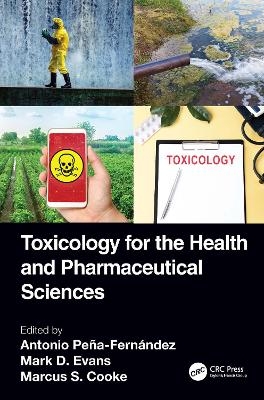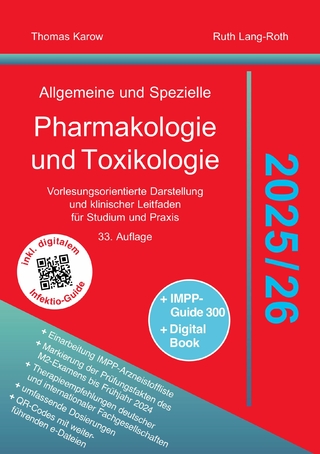
Toxicology for the Health and Pharmaceutical Sciences
CRC Press (Verlag)
978-1-138-30336-2 (ISBN)
There is an increasing need for knowledge of toxicology to safeguard the use of chemicals in industry and in the public and private sectors. The study of toxicology is becoming increasingly relevant in human health sciences, as future health and clinical professionals will be pivotal in addressing and managing emerging chemical threats and hazards related to modern anthropogenic activities and technological development.
Comprising a series of chapters from leading toxicology, pharmacy and public health academics and experts across Europe, the United States and beyond, Toxicology for the Health and Pharmaceutical Sciences provides a concise yet comprehensive volume that can be used as a relevant textbook on toxicology for the clinical, healthcare, educational and professional sectors.
Key Features:
Includes cutting edge information regarding the very lastest environmental threats to public health
Provides a detailed case study based on a real-world scenario that allows the reader to practice human health risk assessment
Describes innovative guidance and tools to respond to chemical incidents and attacks, which enables the reader to tailor an effective protection and remediation response
This book covers the fundamentals and recent developments in toxicology, to respond to local and global chemical, pharmaceutical and environmental threats. Thus, this volume has chapters specifically designed to support the understanding of the most current toxicology-related subjects for any undergraduate/postgraduate health programs as well as aid the delivery of continuing professional development training on up-to-date topics in toxicology for current practicing health professionals wishing to improve their background knowledge in toxicology. The book is also vital reading and reference for policy makers and others that influence and set regulations that have an impact on the environment and human health.
Dr. Antonio Peña-Fernández is an Associate Professor in Toxicology and Medical Sciences in the Faculty of Health and Life Sciences at De Montfort University, Leicester, UK. He has a BSc in Chemistry from the University of San Pablo CEU, a MSc in Toxicology from the University of Seville. His PhD in Toxicology is from the University of Alcalá (Spain, 2011), where he also holds a Honorary Professorship since 2019. Dr Peña-Fernández’s main research work focuses in human biomonitoring as a tool for the assessment of internal doses of contaminants, and the study of emerging chemical and biological threats in urban, industrial and rural environments for the characterisation of risks and the development of protocols to protect the human health and decontaminate the impacted environments. Many of his current projects are international collaborations with different universities and research institutions from England, Spain and Sierra Leone. Projects relate to environmental monitoring, exposure assessment, building capabilities, and the development of protocols, training materials and tools for the protection of human health to different emerging chemical and biological contaminants. Dr Peña-Fernández became a European Registered Toxicologist (EUROTOX) in 2013 and is a Senior Fellow of the Higher Education Academy (SFHEA, 2016). Dr. Mark Evans is a Senior Lecturer in Biomedical and Medical Science in the Faculty of Health and Life Sciences at De Montfort University, Leicester, UK. He is a graduate of Brunel University (BSc.) and Louisiana State University (PhD) with an extensive academic and research background in the area of free radical biology and oxidative stress. During his career he has worked in the areas of cigarette smoking-induced lung disease, automimmune disease (rheumatoid arthritis, lupus) and cancer and prior to coming to De Montfort University was a postdoctoral scientist then lecturer at The University of Leicester. His primary interests lie in the area of DNA damage/repair and role in disease pathogenesis. Additionally, he has worked in the area of human biomonitoring, examining excreted markers of nucleic acid oxidation and their biological sources, particularly the role of nudix hydrolases. Dr. Evans also has active research interests in the therapeutic potential of natural products, primarily anti-cancer activity and mechanism. Dr. Evans has significant experience of teaching/teaching administration for undergraduate, postgraduate and research students, as well as design of and academic lead for MSc. programmes. Dr. Marcus S. Cooke is a Professor in the Department of Cell Biology, Microbiology and Molecular Biology at the University of South Florida, Tampa, where he heads the Oxidative Stress Group. Dr. Cooke’s background is in the Environmental Health Sciences, in particular Environmental Toxicology. He studies oxidative stress, and genomic instability: from basic mechanisms to translational application of validated biomarkers to study human health and disease. Specifically, the formation and repair of damage to nuclear/mitochondrial DNA and the nucleotide precursor pools; and the development and application of DNA adductomics i.e., (i) the totality of DNA adducts in cellular DNA, and urine; (ii) the genome-wide mapping of DNA damage. Translating such laboratory findings to the marketplace, is a priority, and actively pursued. This has resulted in three US and one UK patents, license agreements, industry collaborations and a STTR award from NIEHS. As of March 2021, Dr. Cooke has 119 peer-reviewed publications, which have attracted over 7500 citations, and he has an h-index of 40.
Introduction To Toxicology. Toxicokinetics. Metabolism and Biotransformation of Xenobiotics. Mechanistic Toxicology. Genetic Toxicology and Carcinogenesis. Reproductive and Developmental Toxicology. Juvenile Toxicology. Population Toxicology. In Vitro Toxicity Testing. In Vivo Toxicity Testing. Toxicological Applications of Genomic, Proteomic and Metabolomic Technologies. Toxicology and the Epigenome. Toxic Effects of Pharmaceuticals and Cosmetics. Toxicology of Industrial Chemicals. Toxicology of Herbal Medicines. Food Toxicology. Nanotoxicology. Human Health Risk Assessment. Toxicological Modelling. Human Biomonitoring. Introduction to Environmental Toxicology. Exposomics and Environmental Monitoring. Pesticide Toxicology. Pharmaceuticals and Cosmetics as Emerging Environmental Contaminants. Environmental Recovery and Restoration. Toxicology and Climate Change. Chemical Warfare and Terrorism. Prevention and Treatment of the Toxic Effects 0f Pharmaceuticals and Pollutants.
| Erscheinungsdatum | 23.12.2021 |
|---|---|
| Zusatzinfo | 75 Tables, black and white; 24 Line drawings, color; 73 Line drawings, black and white; 6 Halftones, color; 7 Halftones, black and white; 30 Illustrations, color; 80 Illustrations, black and white |
| Verlagsort | London |
| Sprache | englisch |
| Maße | 178 x 254 mm |
| Gewicht | 1280 g |
| Themenwelt | Medizin / Pharmazie ► Medizinische Fachgebiete ► Pharmakologie / Pharmakotherapie |
| Medizin / Pharmazie ► Pflege | |
| Medizin / Pharmazie ► Pharmazie ► PTA / PKA | |
| Studium ► 2. Studienabschnitt (Klinik) ► Pharmakologie / Toxikologie | |
| Naturwissenschaften ► Biologie ► Biochemie | |
| ISBN-10 | 1-138-30336-4 / 1138303364 |
| ISBN-13 | 978-1-138-30336-2 / 9781138303362 |
| Zustand | Neuware |
| Informationen gemäß Produktsicherheitsverordnung (GPSR) | |
| Haben Sie eine Frage zum Produkt? |
aus dem Bereich


